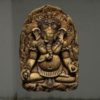We are talking about Ganesha today, as well as some other things.
Male or female Ganesha? Well, Hindu devas tend to be sort of fractal, so in a sense both but most typically seen as male. The name stems from the native language that doesn’t much follow English language forms. In fact, it’s actually a combined word more than a name as we normally think of them. Ganesha is both a name and a title. It’s a combination of ganna and isha. Ganna being groups, and Isha being lord or leader, so it means lord or leader of groups.
The first thing necessary to understand any of the devas is an understanding of karma. Karma is cause and effect, but it also goes beyond that. It is perhaps most like the Chinese concept of Tao. It isn’t so much a system of judgment as it is a sense of order. Bad karma not being so much the equivalent of sin as we understand it these days as it is a form of things being out of order.
Yes or lokahi. Balance/things in right place at right time. Ah, excellent.
And well, we can explore that more later if its seems appropriate, but this is where Ganesha comes in. Things being in the right place at the right time.
Yes, we (Native Hawaiian) never got that deal about karma being sin or evil or revenge or all that. Bad karma? No. Indeed, it’s a common misconception. In fact, even the concept of lord or deity can get a bit confusing.
As I commented earlier, the devas are sort of fractal beings, so although Ganesha is most commonly seen as male, he is also just as legitimately female and encompasses many truths. Ganesha has some symbolism that is universal between traditions; the pot belly being perhaps the most universal, as well as the elephant head. The pot belly is a sort of symbolic pregnancy in a way. Ganesha being full of the cosmic eggs or universe seeds of every age and all possibility.
Now what makes a deva a deva is not some privileged position of governance so to speak, but more the beings relationship to the entire universe often symbolized as the figure of Brahma. Ganesha has as its essential responsibility the placement and removal of obstacles.
Now I ask you, what in our experience of life is untouched by this really?
Not even crashes online! Indeed, but Ganesha’s role is universal, and not necessarily equally revered in all traditions. Ganesha places the obstacle as well as removing it which makes this deva similar perhaps to the loa exu from African lore, and these obstacles even include the other devas. So despite philosophical misgivings in many traditions, Ganesha has been and continues to be very popular. The understanding represented by Ganesha is very accessible, very down to earth so to speak. I myself see Ganesha as being the elephant in the room, as well as the blind mans elephant, and I will go into that if that’s interesting.
Your thoughts are welcome. Be well friends.
Travis Saunders
Dragon Intuitive
~science,mysticism,spirituality~



Leave a Reply